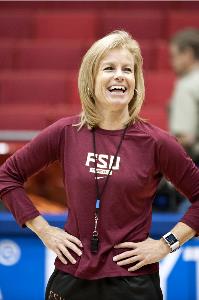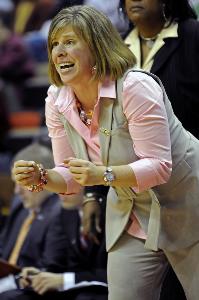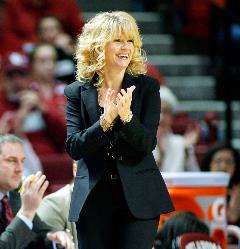It doesn’t get much better for college basketball fans, with their eyes firmly fixed on all the games, scores and highlights during the most exciting time of the year on the hardwood—March Madness.
Vying for the NCAA Division I Women’s Basketball Championship are coaches who have talked to FCA about how keeping their eyes fixed on Jesus Christ is key—especially as the pressure mounts.
 Sue Semrau—Florida State
Sue Semrau—Florida State
Sue Semrau, the 2013 FCA Kay Yow Heart of a Coach Award recipient, didn’t see a future in coaching, but her 20 standout seasons at Florida State proves she made the right call.
“I didn’t think I would ever be a coach,” Semrau said. “But once I started, I just really fell in love with the game even more, and it brought about the merging of basketball and my faith.”
“Coach Sue,” as she’s known, was named the Associated Press, WBCA and ESPNW National Coach of the Year in 2015 and is a three-time ACC Coach of the Year, as well as the all-time winningest coach in FSU history. She’s guided the Seminoles to 12 previous NCAA Tournaments, including two Elite Eight appearances.
Semrau was first introduced to FCA through a volunteer stint at an FCA camp. There, Semrau told FCA, she began to understand what a relationship with Christ was really about.
“It wasn’t a decision about Jesus,” she said. “The Bible says that even Satan believes and shudders when it comes to Jesus. I always believed in Jesus, but so what? So does the devil. It’s become less about believing in Jesus and all about truly accepting the gift of salvation I was being offered and what I would do with it.
“It's like a basketball pass,” she continued. “You can choose to receive a pass, or you can do nothing and just let it go out of bounds. But once you receive the pass, the real question becomes what you’ll do with it. I realized it was time for me to create scoring opportunities.”
Most coaches know that their job security might change in an instant, and moves from team to team are common. But Semrau says she no longer worries about what’s next, a fear she fell into during the early days of her FSU career.
“I just don’t pay a lot of attention to the future, because, if I could have planned my life in advance, this would not be what I planned,” she said. “It’s been incredible. It’s like an ad-venture. What’s God going to do next? What does He want me to do next? I certainly never guessed I’d be at Florida State for 18 years, so whatever He wants me to do and wherever He wants me to go, I’m open to it.”
And, she said, when the Holy Spirit is equally as evident in your walk and talk, it makes for a more powerful witness, something the longtime coach takes to heart as she helps guide Seminole players through their time in Tallahassee.
“St. Francis of Assisi said, ‘Preach the Gospel always and, when necessary, use words,’” Semrau said. “I strongly believe as Christians that it is not our job to judge. I want to live in a way where people see Christ in me and in the way I live my life, and live it in such a way that when things are hard people say, ‘What is it about you? How can you handle this?’ I know I can’t handle anything. When I start to drift away and things become my choices and my problems, that’s when they fall apart. It’s His choices for me, it’s His work in me, and all of it is for His glory. We’ve got to give our time to God. I don't want to hoard my life’s plan. I want it to be God’s, to really give of my time and let God do what He wants to do. I’m not very smart, but God uses the foolish to confound the wise, so I’ll let Him do His thing. I wouldn’t have it any other way.”
 Cori Close—UCLA
Cori Close—UCLA
Named the women’s basketball head coach at UCLA in 2011, Close told FCA she knew UCLA was a great fit for her from the start.
“I’ve always prayed that God would prepare me to accept the right position when it came along, and this was it,” she said. “It’s not a job; it’s a lifestyle, and I’m getting to share it with friends and family who have invested so much in me. Even in the midst of the chaos and the hard transitioning years ahead, I’m very peaceful because I believe it is the place God has for me.”
And during those chaotic times of her job, Close says she focuses on phrase, “give us this day, our daily bread,” from the Lord’s Prayer.
“Each day can be overwhelming, and there are so many things that I don’t get done on my to-do list,” Close added. “I’m literally just asking God to give me what I need for that day. When I pray that verse fervently, live it out and let it sink into my heart, I feel closer to Jesus, and that’s where I need to stay.”
Close also told FCA that one of her coaching goals is to ensure that all she encounters feel valued and loved, whether they share her faith or not.
“I just want to enter their world and serve them and love them in a way that reflects what I’ve received from Jesus,” she said. “I believe this is my ministry and what God has called me to. The average Division-I basketball player spends more than 3,000 hours in his or her sport over four years, and only 4 percent of those hours are in games. No one will spend more personal time with the players than their coaches. I pray that, for me, during those hours, God will provide me with opportunities to affect the lives of our players in deep and meaningful ways.”
Close went on to say how FCA has influenced her outlook—both on sports and on life.
“FCA has been a tremendous blessing,” Close said. “I’ve connected with some great people through it, especially women who have sacrificed so much to invest in student-athletes at all levels. Girls are seeking places where they can ask hard questions and get answers. We need ministries like FCA so that they have a place to go with these questions and to learn how to walk through life with Christ.”
 Sherri Coale—Oklahoma
Sherri Coale—Oklahoma
A longtime friend and supporter of FCA, Sherrie Coale was inducted into the Women’s Basketball Hall of Fame in 2016—an honor recognizing her impressive coaching success and her many years of impacting young athletes.
Coale has led Oklahoma to three Final Fours since taking over the program in 1996, and the Sooners have made the NCAA Tournament for 18 straight years under her leadership.
“FCA is an energy source, a guiding light, and a gentle compass that serves young athletes as they face the equally daunting tasks of handling success and failure,” Coale said of the ministry. “Simply said, FCA keeps Jesus in the daily conversation of the lives of young people.”
Coale also shared her thoughts on coaching with FCA Magazine:
On the importance of pushing players to be better outside of basketball:
“If basketball were only about a season or a championship or even a career, it would be way too much time, effort and investment. It has to be about something more. And for us, we realize we have student-athletes for, at most, five years, so we try to get in life skills—ways to go out and make a significant difference in the world. We want to arm our players, and there is no better training round for how to live and make a difference than the field of athletics.”
On wearing many hats:
“My mantra is, ‘Whatever you are doing is the most important thing while you are doing it.’ When I am coaching, I need to be coaching. When I am being a mom, I need to be a mom. When I am being WBCA president, I need to be president. You can’t try to do them all at once. You have to live in such a way as to support all those roles, but you have to focus on the thing you are doing while you are there.”
On defining success:
“It’s making a difference in people’s lives. If you coach for 25 years and never win a championship but you influence three people for Christ, that is success. It’s not about the wins and losses, but about what you teach people.”
On FCA:
“When I was a high school teacher and coach, I saw the difference FCA can make in a kid’s life. I watched students who didn’t even know what the Bible was really grow and develop a personal relationship with Christ. That was when I really got hooked on FCA.”
 Robin Pingeton—Missouri
Robin Pingeton—Missouri
Coaching wasn’t in the original post-college plans for Robin Pingeton, but a love of athletics and desire to teach the game opened her eyes to opportunities the profession provided. Named the head coach at Missouri in 2010—and now in her 23rd year overall as a head coach—Pingeton is proof that building on the foundation of strong Christian character is the key to leaving a lasting impact.
“I feel like I’ve learned so much in all facets of my life,” Pingeton told FCA, as she looked back on more than two decades of coaching, “and I hope I continue to grow and learn. This game—and our journey through life—are full of opportunities to get better and grow. My challenge for myself each day is to be better than I was yesterday. That applies as a basketball coach, wife, mother, friend and boss.”
Pingeton added that it can be easy to fall into the trap of focusing solely on wins and losses, but she keeps her eye on what’s eternal rather than what the scoreboard says.
“I’ve got a drive and work ethic that is second to none, but I constantly have to remind myself about the big picture,” she said. “My goal is to win championships, but my passion is to impact people’s lives and make a positive difference. If you don’t keep blinders on as a coach, you can lose sight about what’s most important. I’ve always been someone who is very open about my priorities being faith, family and then my career. Scoreboards, the history book, the stat book—you can’t keep any of that with you, but the values and the lessons learned through college athletics are what will remain with these kids for the rest of their lives.”
Coaches, Pingeton said, have an opportunity to impact not only their players but the community, state and country as well.
“I truly do feel like coaching is a ministry, and it’s not just about taking your Bible out and talking to players about their faith,” she said. “More importantly, it’s about walking out our faith every day. I know my foundation, the baseline principles in my life and my value system, and it certainly has to continue to grow and get better to help other people grow in their faith and in their walks with the Lord. The best way I can share my faith is the way I live it out every day and the way I handle success, adversity, and challenging times, walking with my players through the journey together.”
Ultimately, Pingeton told FCA, she hopes her players will take away much more than basketball skills after their time on her team comes to a close.
“I hope I’ve impacted their lives in a very positive way and been a mentor and a teacher,” Pingeton said. “I want to be someone who has helped them understand what it truly takes to be successful in relationships, careers and life after athletics. That comes from a lot of hard work, a lot of discipline, accountability, attention to detail, and the ability to communicate. I want to challenge my players every day to be their absolute best in everything they do.”
Photos courtesy of Florida State University, UCLA, Mizzou Athletics, University of Oklahoma and University of Missouri